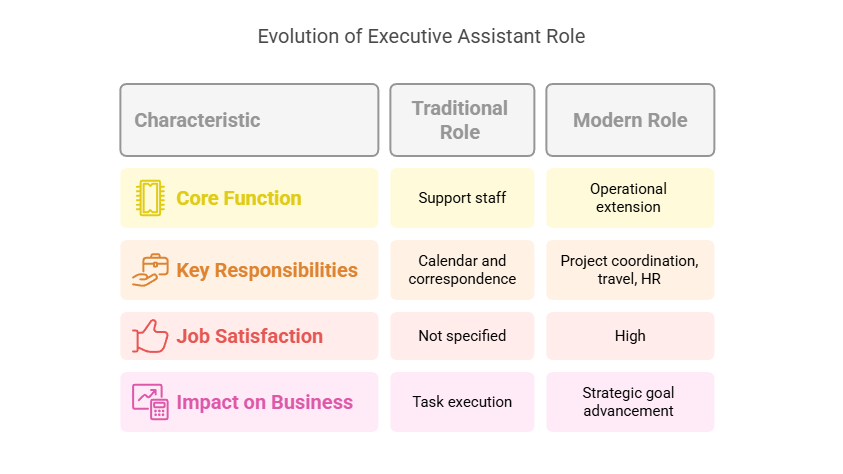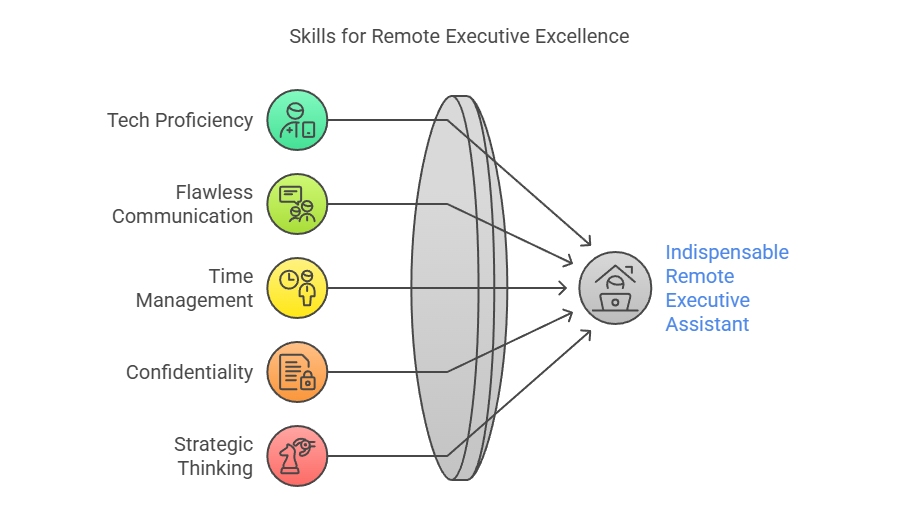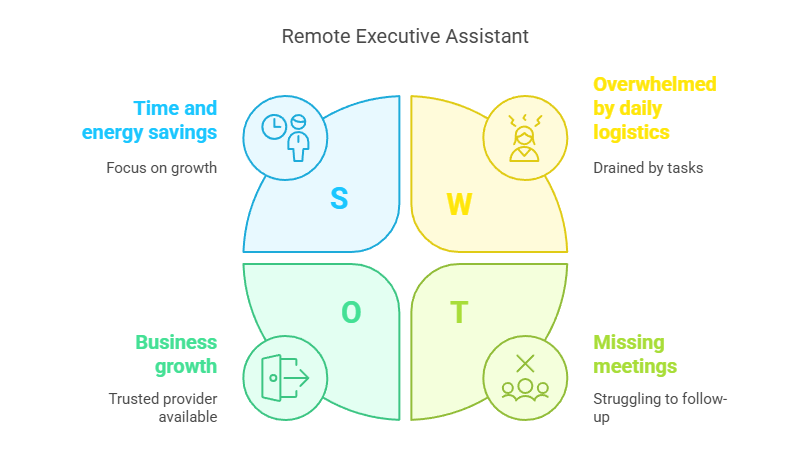
Why Remote Executive Assistants Are the Secret Weapon of Modern American Business
In today’s fast-paced, digital-first world, the traditional role of the executive assistant has undergone a dramatic transformation. No longer confined to office walls, remote executive assistants are now among the most essential assets for C-level leaders, entrepreneurs, and growing startups across the United States. With powerful technology and streamlined communication tools, businesses are discovering the efficiency, cost-savings, and flexibility that come with hiring a virtual EA.
In this blog, we’ll explore why remote executive assistants are booming in America, how much they earn, what skills they bring, and why platforms like TaskVirtual are helping business leaders scale smarter.
The Rise of the Remote Executive Assistant in the United States

The demand for remote executive assistant roles in the U.S. has surged in recent years, thanks to a combination of remote work normalization, technological advancements, and business leaders needing flexible support.
A report by the Executive Assistant Institute shows a 25% increase in remote EA roles globally, with the U.S. being one of the top markets adopting this model. This trend is not surprising—American businesses are now prioritizing agility, and remote assistants offer support without geographical limitations.
As of 2025, data from Empllo shows that remote executive assistants in the U.S. earn an average salary of $115,313, with many drawing between $95,000 and $135,625 annually. These numbers underscore the strategic value companies place on skilled EAs, especially when remote.
How the Role of an Executive Assistant Has Evolved

Executive assistants used to be seen mainly as support staff, handling calendars and correspondence. Today, that’s only a fraction of what they do—especially in remote setups.
According to the Executive Assistant Institute, 60% of EAs now manage additional responsibilities like project coordination, travel logistics, vendor management, event planning, and even HR onboarding. They’ve essentially become operational extensions of the executives they support.
Furthermore, 82% of executive assistants report high job satisfaction, due in part to the variety of their work and their direct impact on business operations. For American businesses, this translates to hiring motivated professionals who don’t just execute tasks but help move strategic goals forward.
Top Skills That Make Remote Executive Assistants Indispensable

To function efficiently in a remote capacity, today’s executive assistants must be more than organized—they need to be technologically savvy, adaptable, and proactive. Below are the top skills that set remote EAs apart in the American corporate landscape:
1. Tech Proficiency
Remote executive assistants must navigate tools like Google Workspace, Zoom, Slack, and project management platforms such as Asana, Trello, or Monday.com. These systems are the lifeblood of virtual collaboration.
2. Flawless Communication
Whether drafting emails or relaying meeting updates, remote EAs must communicate clearly, respectfully, and efficiently. Exceptional written and verbal communication is a non-negotiable.
3. Time and Priority Management
Remote executive assistants are often juggling multiple calendars, time zones, and teams. Their ability to manage deadlines, prioritize tasks, and prevent bottlenecks makes them vital to keeping executives on track.
4. Confidentiality and Discretion
Many American executives in healthcare, law, or finance require their assistants to handle sensitive data. Remote EAs must adhere to strict confidentiality protocols, especially when working in regulated industries.
5. Strategic Thinking
The best assistants can anticipate an executive’s needs, identify potential challenges, and offer solutions before issues arise—this level of strategic foresight is what separates average EAs from elite ones.
Why American Companies Prefer Remote Over In-House EAs

There’s a clear economic rationale behind the growing shift. Hiring in-house executive assistants involves added overhead—office space, equipment, benefits, insurance, and compliance with local labor laws. Remote EAs significantly reduce these costs.
Beyond savings, remote hiring opens up a national (or even global) talent pool, allowing businesses to find the perfect fit regardless of location. This is especially valuable for startups or mid-sized firms in cities with a high cost of living. Why hire a $120K in-office EA in San Francisco when you can find someone equally qualified in Austin or Tampa for less?
Remote EAs also offer greater scheduling flexibility. Need someone to handle early morning calls with a European client and late-night investor meetings on the West Coast? A remote assistant working from a different time zone can bridge the gap.
Where to Hire a Reliable Remote Executive Assistant: Spotlight on TaskVirtual
When it comes to sourcing talented, vetted remote executive assistants, TaskVirtual has become a go-to solution for many American professionals and small business owners.
Here’s why TaskVirtual stands out:
1. Expert Consultation for AI-Powered Productivity
TaskVirtual doesn’t just match you with an assistant—they guide you through AI-enhanced productivity strategies to make delegation smoother and more intelligent. This ensures you’re maximizing your assistant’s impact from day one.
2. Flexible Pricing Starting at $3.12/hour
Whether you’re a solopreneur or managing a mid-sized enterprise, TaskVirtual offers affordable pricing plans ranging from just $3.12/hour to $14.99/hour—far less than the average salary of an in-house EA.
3. Highly Rated by Real Users
With 364 verified positive reviews and an average 4.7-star rating across virtual assistant reviewing platforms, TaskVirtual has earned a reputation for consistent quality and professional service.
4. Broad Service Capabilities
TaskVirtual EAs can handle not just scheduling and email management, but also research, CRM updates, client follow-ups, and even light marketing tasks. Their assistants are trained to wear multiple hats—ideal for dynamic American workplaces.
Who Should Hire a Remote Executive Assistant?

If you answer “yes” to any of the following questions, a remote executive assistant may be exactly what you need:
-
Are you spending more than 3 hours a day on scheduling, emails, or admin tasks?
-
Are you missing important meetings or struggling to stay on top of client follow-ups?
-
Do you feel your energy is being drained by tasks that someone else could do more efficiently?
-
Are you planning to grow your business but feel overwhelmed by daily logistics?
If so, consider trying a remote EA through a trusted provider like TaskVirtual. The first week of delegation could reclaim dozens of hours of your time—and help you focus on strategy, innovation, and growth.
Final Thoughts: Remote Executive Assistants Are Here to Stay
The American workplace continues to shift rapidly, and the role of the executive assistant—remote or otherwise—is more critical than ever. The smartest leaders don’t just hustle harder; they delegate better. A well-trained, remote EA can become your right hand, strategic partner, and operational backbone—all without occupying a physical desk in your office.
Whether you’re a startup founder in New York, a solopreneur in Phoenix, or a nonprofit director in Chicago, it’s time to rethink how you use your most valuable asset—your time.
Make the most of it. Hire a remote executive assistant. Start with a free consultation at TaskVirtual.






